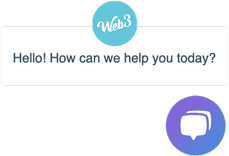In this episode of the Web3 Marketing Debate Show, James and Joseph debate whether you should use paid social media or non-paid/organic social media. James is on the paid social media side and Joseph is on the non-paid side.
Should you use social media to grow your brand, gain new customers and build your business faster? Obviously we know the answer is yes but is it best to use paid or non-paid methods? Find out what Web3 think in episode four of this great marketing debate.
Paid vs organic social media episode show notes
James: Hello, everyone and welcome to another episode of the marketing debate show. I’m your co-host James Banks.
Joseph: And I’m your co-host Joseph Chesterton.
James: And today we will be debating another red hot subject, which is non paid social media versus paid social media. So I’ll be taking the paid social media side of the ring, and Joseph will be taking the non-paid organic social media side.
Well, without further ado, let’s start the debate. So, Joseph, what out of the two out of paid social media verses non-paid social media, why is non-paid or organic social media work better than paid social media?
Why is that working the best right now of the too? What’s your opinion?
Joseph: The thing is, with social networks, they rely on content. So if you’re creating content, then obviously that content is what they require. Non paid or organic social media content is number one because the platforms rely on users using the platform to then market to.
Yeah of course, there’s sponsored or paid posts on social media, but without non paid social content, then the platform simply won’t work because it would just be a whole bunch of ads, and that’s it. Obviously you have to go to the right platform and your business can reach an infinite number of people on social media.
Obviously, they need to go the right platform like, for example TikTok, that’s best for millennials and Facebook, possibly the older demographic as well as young.
As long as you’re content appeals to the audience that you are targeting, then they will engage with it. They’ll like, they’ll share and they’ll subscribe, and then eventually obviously, sell whatever it is you’re selling, as long as the content that you’re creating is engaging and people are interacting and liking your content, then algorithms will like that and show more of your content so you don’t actually need to then pay to keep your rankings or keep your brand in front of the customers that you’re targeting.
That’s why non-paid social media is what’s best right now. Obviously, you’ve got your opinion on paid, James.
James: Joseph. I think you’re caught in a time machine in the year 2014 because the fact of the matter is organic reach on Facebook for businesses has been killed and they’ve killed it on Instagram, and they’re killing it now. They’re starting to kill it now on Linkedin.
This is how these platforms work. They give heaps of free organic reach. No, you don’t have to pay for it. They get everyone using it, everyone loving it. And when they hit a critical mass and an inflection point, then they pull the organic reach plug out of the system, which then forces the people to have to pay for it. Or forces the businesses to pay for it to be taken seriously.
I think the elephant in the room is which one is best for making money. And if you want to use social media to make money, you have to be running paid ads. Relying on organic reach only means that you’re going to reach the same, you know, relatively the same amount of audience, with the same amount of message. Growing out and reaching new people at scale, at targeted scale, there’s no better or efficient way to do it other than doing it with the paid advertising platforms.
Plus it is what the whole objective, the commercial objective of these social media tools is, too get… Oh how they make money is through their advertising networks. So of course they’re going to favour and sort of manipulate and manoeuvre businesses into doing it in exchange for them to be able to actually reach new people.
So I think it’s hands down the only way where if you want to be looking at the context of making money. Brand building something separate and we can address that next. Actually, that’s a whole different ball park. But under the subject of making money, you need to pay to play with these platforms. That’s very clear. That’s very obvious.
On the flip side, however, why would, talk to us about brand building, which way is best for building a brand? Is it the paid approach? Is it the organic, non paying approach? What’s your opinion, Joe?
Joseph: Well, you did mention pay to play. Obviously, there is a certain aspect to social media where you can pay to get in front of your audience. But if you are in the right platform at the right place where your target market are hanging out, so to speak, then content and non-paid ways is a perfectly viable way to grow your business and build your brand.
It’s not about whether you pay or don’t pay. It’s about being consistent and getting in front of your target audience wherever they are. To do that, you need to keep your brand presence active and you need to be in front of your target market.
All these platforms have metrics where you can view how your content is performing and you use these metrics to improve your content. As long as you’re tracking what people are clicking on, what age, what location, All the different metrics and you’re continually utilising these platforms, then you can easily build a brand and a huge following from posting content.
Just look at all those instagrammers. They don’t pay to play. They get paid to play.
James: Absolutely because they grew their following back when you could do it organically. And now that they’re reaping in the rewards after that Instagram pulled the plug on the platform for new profiles that really genuinely struggle that don’t have a pre-existing audience to actually grow to have something of substantial reach.
However, in your defence. Ultimately, and this is starting to bring everything together is that organic posting is still the way to go forward with building not only building a brand presence but also remaining front off mind with the audience that’s already actively following you, and is already actively engaged.
Perhaps they found you and discovered you through your paid advertising efforts. Found you engaging enough to follow you. Then the organic content is what then keeps them engaged. So you don’t just become a brand that they forget overnight. It keeps them engaged in, perhaps potentially then down the track. They convert into customers for your business.
So in summary and again, no surprises here is ultimately it isn’t an either or play here. Businesses that want to win the social media game ultimately need to be firing on both cylinders. That is, having a good organic social media content marketing strategy that’s optimised for maintaining and increasing the brand presence with the audience that you’re targeting and also using paid social media to not only increase your audience reach. But then also position middle of the funnel content, such as things such as opt-ins, webinars, things that you can then use those details and bring it into your sales funnel to then, for a percentage of the people that opt in, there’s a chance that they could convert into leads and customers for your business.
So being able to combine both strategies together is where businesses win, that’s what we do here at Web3. And this is what we help businesses achieve and succeed online is by bringing both together to a unified strategy that helps grow the business at the end of the day.
Allrighty, well, that is another episode of the Web3 Marketing debate Podcast. I hope you learned something new, and we’ll be in touch real soon. Joseph, what are we, whats a teaser for the next episode that you can share?
Joseph: Yeah, hope you enjoyed that episode. Next episode will be talking about landing pages. Whether you use a third party software or your use WordPress. That’s what we’ll be debating.
And that’s a wrap for this episode of the Marketing Debate show. If you liked it, please give us a positive rating on your preferred podcasting platform.
Here’s the previous episode: SEO VS Google Ads: The best ROI for your website
And here’s the next episodes:



